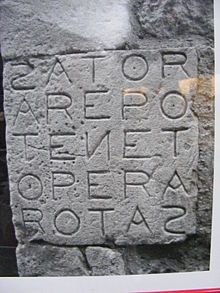- Magic word
-
Not to be confused with magical formula.For the use of magic words on Wikipedia, see Wikipedia:Magic words.The Sator Square

Magic words are words which have a specific, and sometimes unintended, effect. They are often nonsense phrases used in fantasy fiction or by stage prestidigitators. Certain comic book heroes use magic words to activate their super powers. Magic words are also used as Easter eggs or cheats in computer games, other software, and operating systems. (For example, the words xyzzy, plugh, and plover were magic words in the classic computer adventure game Colossal Cave Adventure).
Contents
Invocations of magic
Examples of traditional magic words include:
- Aajaye - Used often by the clowns in Jaye's magic circus.
- Abracadabra - prototypical magic word used by magicians.
- Alla Peanut Butter Sandwiches-used by The Amazing Mumford on Sesame Street.
- Alakazam
- Cei-u used by the DC Comics superhero, Johnny Thunder, to summon his magical genie-like Thunderbolt.
- Hocus pocus - a phrase used by magicians.
- Joshikazam used by Josh Nickels, a character from the popular Nickelodeon show "Drake and Josh".
- Klaatu barada nikto - A phrase used in the 1951 movie The Day The Earth Stood Still. While not intended as magical words in that movie, they were used as such in the spoof horror movie Army of Darkness.
- Meeska, Mooska, Mickey Mouse - used on the children's TV series Mickey Mouse Clubhouse to make the Clubhouse appear.
- Open sesame - used by the character Ali Baba in the English version of a tale from the collection popularly known as 1001 Arabian Nights.
- Presto chango or Hey Presto - used by magicians (probably intended to suggest "quick change").[1]
- Sim Sala Bim a phrase used by Harry August Jansen. "Sim Sim Sala Bim" are the magic words said by Hadji on the shows The Adventures of Jonny Quest and The Real Adventures of Jonny Quest.
- Shazam - used by the comic book hero Captain Marvel.
- Izzy wizzy, let's get busy - Used on The Sooty Show when using Sooty's magic wand.
- Wella Walla Washington - bugs bunny looney tunes
Craig Conley, a scholar of magic, writes that the magic words used by conjurers may originate from "pseudo-Latin phrases, nonsense syllables, or esoteric terms from religious antiquity," but that what they have in common is "language as an instrument of creation."[2]
Note that the television game show You Bet Your Life, hosted by Groucho Marx in the 1950s, used the term secret word, not magic word. ("Say the secret word and win a prize!")
Magic words in technology
Software like MediaWiki uses "magic words" to make system information available to templates and editors, such as {{CURRENTTIME}}, which displays the server time: 02:50, see Help:Magic words.
Hexadecimal "words" used in byte code to identify a specific file or data format are known as magic numbers.
Manners
The term magic word may also refer to the word please when used by adults to teach children manners:
"Gimme ketchup now!"
"What's the magic word?"
"Sorry. May I have some ketchup, please?"
Or, from some particularly children: "Gimme ketchup, pleeeEEEEEASE?"The single word changes an imperative order into a conditional request, concisely communicating "Do as I say, if it pleases you."
The "magic" is a result of simple psychology, because when a person feels respected they are much more likely to choose a harmonious response.[citation needed]
Likewise, other magic words exist as part of a social contract, designed to express affection for another. Such words are magic not because of their effect on people (If they were, this would be simple manipulation, not etiquette) but because they make others feel better in context of the situation. For example:
- Please should not be used for just any request, but a request that might be considered unreasonable without it. This is because it is used to reflect the knowledge that the asker understands the trouble involved in the request.
- Thanks is used to show that the other person's actions are valued.
- Sorry is perhaps more important than the first two, as it is used to express regret over one's actions. Without such regret, relationships often dissolve over time. Also, contingent on this idea is the promise of not repeating the action (a promise which may be difficult or impossible to carry out, which is why some people are reluctant to apologize).
- In addition, an unofficial magic word may be added, since it follows a similar idea. The word Stay (not as it is used to dogs, but as the opposite of "Leave!") could be considered magic since it expresses the idea that the person is loved or wanted, and that they belong.
See Etiquette
See also
References
- ^ Magictricks.com
- ^ Conley, Craig (2006). Magic Words: A Dictionary (revised second edition). In-Spired.
Categories:- Magic words
- Magic (paranormal)
- Words
Wikimedia Foundation. 2010.

